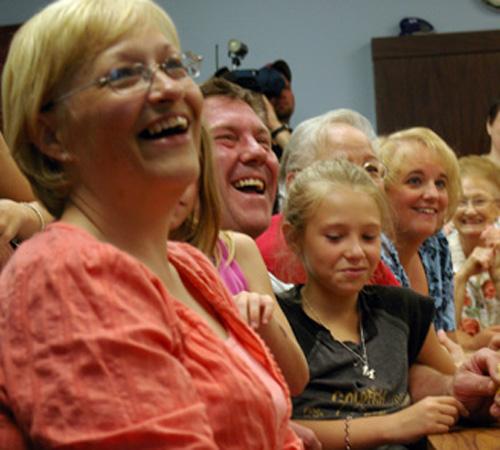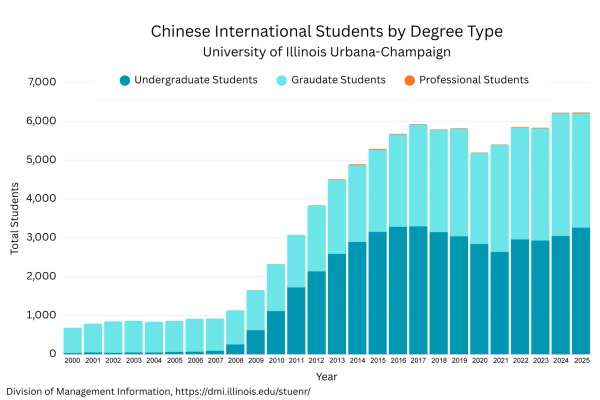Bridging the gap between soldiers and families

Jul 11, 2008
Last updated on May 13, 2016 at 12:16 p.m.
For one hour on Wednesday afternoon, the 7,000 miles separating Spc. Gregory Regan Jr. from his family back in Illinois was reduced to insignificance.
Thanks to the “See Your Solider” program, Regan, a young soldier in the U.S. Army stationed at Camp Taji in Iraq, spoke face-to-face – via videophone – with a group of his family through the “See Your Solider” program at the University of Illinois Extension Center in Champaign. At first, Regan’s family was told that technical issues had delayed their scheduled videoconference 40 minutes, but 10 minutes later, a picture of an empty chair came up on the conference room screen. Soon, a baby-faced 20-year-old with a buzzcut and fatigues appeared.
“There’s Gregory!” a voice hollered, and a rush of cheers and applause followed. On the screen, a smiling Regan waved and greeted individual family members as the webcam panned around the room. For the first time in nine months, Regan and his family were able to see each other.
An uninterrupted stream of questions and comments followed. Despite the circumstances surrounding the event, the conversation sounded little different than one between family and a college student away at school.
Get The Daily Illini in your inbox!
“How are you doing?” “Are you eating well?” “Is it hot there?” “Did you get our packages?” “We’ll go fishing when you get back!”
The ongoing war seemed to fade away from everyone’s mind.
“It was great to actually see him, to know that he’s OK, and that he still has his sense of humor,” said Peggy Zachary, Gregory’s mother. “He’s still a kid at heart, but he has tremendous responsibilities.”
The program, facilitated by the University and the Freedom Calls Foundation, allows families to see loved ones in the armed forces deployed to Iraq via an Internet-based videophone. The service is available on selected dates at University of Illinois Extension Center locations across the state. In Champaign, some 40 families have participated, according to Dennis Bowman, an Extension educator and site coordinator. A variety of factors on both sides must align – families reserve time slots on a first-come, first-served basis, and the soldier must be on leave from his unit at a properly equipped camp when the videoconferences take place. Even then, nothing is guaranteed.
“We have had cases where the family got here, and then the soldier couldn’t make it,” Bowman said. “We’ve also had the other way, where the soldier showed up in the room, and the family didn’t make it.”
However, despite the scheduling difficulties, the opportunity to see Regan while he is stationed overseas was impossible for his family to pass up.
His parents, siblings, aunts, uncles, grandparents and others happily rearranged their schedules to see him in person. Some of them received less than 12 hours of notice.
Although Regan frequently interacts with friends and family back home via social networking Web sites, the difference between a typed-out message and a conversation via video was huge for his concerned family.
“I actually talked to him on MySpace, but seeing him move and how he looks – it’s one thing to have a conversation online with him, but you don’t know how much is fluff and how much of it is saying something so Mom doesn’t worry,” Zachary said.
“To be able to see his emotions, his facial expressions, is definitely important,” Rob Zachary, Regan’s stepfather, added.
After all, despite the enormity of his duties in the Army, Regan is still a young man who could easily be entering his junior year of college. He isn’t old enough to drink – in fact, he doesn’t even have a driver’s license back home, despite serving in a cavalry regiment that transports troops with “Stryker” armored personnel carriers.
At the age of 16, Regan fell on hard times and dropped out of high school. After enrolling at Lincoln’s Challenge Academy in Rantoul, Ill., however, his family noticed a total change in his character.
“Oh, it was like a complete 180,” Terri Lee Wegeng, Peggy Zachary’s cousin, said.
In 2006, he enlisted in the Army and was deployed to Iraq the following year.
“He needed the structure, the authority, that kind of thing,” Peggy Zachary said. “He’s grown tremendously.”
Regan isn’t leaving the Army after his tour of duty is complete, either. He has already re-enlisted for another tour, is pursuing a promotion to sergeant and wants to attend Ranger school sometime in the future.
For an hour on Wednesday, however, Regan wasn’t a soldier serving his country in a volatile war. He was just Gregory.





